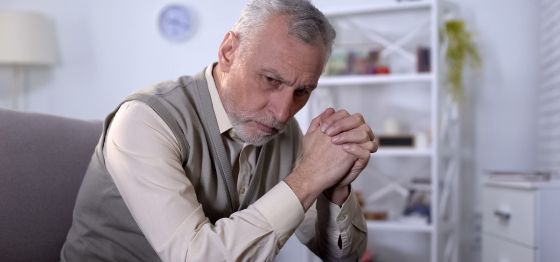Post-Traumatic Stress Disorder (PTSD) is a mental health condition that may develop after a person is exposed to an event in which possible or actual death or severe bodily injury occurs.1 Traumatic events may include natural disasters (hurricanes, earthquakes, floods), acts of violence (assault, abuse, rape, terror attacks, mass shootings), and car crashes or other accidents.2
People who develop PTSD include survivors of such traumatic events, as well as rescue workers and military troops.3 According to the National Institute of Mental Health, nearly 7% of adult Americans develop PTSD at some point in their lives, though it may develop at any age.4 Women are more likely to suffer from PTSD than men, and there is also evidence that PTSD may run in familes.5
During or after a traumatic event, it’s perfectly natural to feel afraid, as fear is part of the body’s “fight or flight” response in times of danger.6 Additionally, feeling sad, angry or anxious, having trouble sleeping or concentrating or constantly thinking about what happened are all normal reactions to trauma which usually decrease over time.7 If not, the person having those reactions may be diagnosed with PTSD.8
Symptoms of PTSD
Because the nervous system and the ability to tolerate stress differs among people, PTSD develops differently for each person.9 People are most likely to develop symptoms of PTSD in the hours or days immediately after a traumatic event, but it may take weeks, months, or even years before the onset of symptoms.10 Sometimes they appear seemingly out of the blue, or they may be triggered by a reminder of the original event, such as a noise, an image, a word or an odor.11
While they may vary from person to person, at least 1 of these PTSD symptoms is present in everyone experiencing this disorder:12
- Reliving the traumatic event
Flashbacks or dreams that sometimes cause people to re-experience traumatic events may be triggered by a noise, like a car backfiring, or seeing something similar, such as an auto accident, a structure fire or severe weather.
- Avoiding reminders of the traumatic event
A person experiencing PTSD may avoid people or situations that are reminders of the trauma. Examples may include friends made during military service, the certain part of town where the traumatic event happened, or even crowds or large gatherings. People with PTSD may try to avoid thinking about the event by staying so busy that their minds can’t wander to a place they don’t want it to go.
- Thinking or feeling negatively
PTSD may cause a person to experience all kinds of counterproductive thoughts and feelings including anger, sadness, distrust, guilt, self-blame or numbness.
- Feeling on edge or constantly on alert
PTSD may also make it hard for affected people to relax or enjoy life. They may feel anxious or jittery and easily startled. Some may constantly expect something bad to happen, even when no threat is present. Plus, they may also have trouble concentrating or sleeping.
Causes of PTSD
While the exact cause of PTSD may be unknown, various psychological, genetic, physical and social factors are all involved.13 Researchers know that PTSD alters the body’s response to stress, affects the hormones and chemicals that convey information between nerves, and more likely develops in people who’ve suffered trauma earlier in life, sometimes months or years after the event.14 Other risk factors may include a family dysfunction or a family history of mental illness.15
PTSD assessment
The diagnosis of PTSD is performed by a mental health provider; it may begin with an in-depth assessment that lasts anywhere from 15 minutes to 1 or 2 hours and includes the patient’s responses to certain questions about their thoughts, feelings and behaviors concerning traumatic events.16 The provider may also ask if it’s OK to speak with a partner, spouse or family member in order to understand what they’ve observed.17
Treatments for dealing with PTSD
There are 2 main treatments for people with PTSD—psychotherapy, medications or a combination of both. Since each person’s experience with a traumatic event is different, treatment may vary and be customized to address the specific symptoms and needs of each individual with the disorder.18 Some people with PTSD may need to work with their mental health provider, trying a few different treatments to see what works best for them.19
Resources for coping with PTSD
There are a variety of ways to cope with PTSD, starting with self-care strategies that include:20
- Avoiding alcohol or drugs
- Spending time with supportive family and friends
- Maintaining routines for meals, exercise and sleep
- Engaging in activities—exercise, mindfulness, etc.—that help reduce stress
- Setting realistic goals and staying focused
Accessing other coping resources may start with the patient’s primary care provider, who can recommend psychiatrists, psychologists or clinical social workers who have experience in treating PTSD.21
The Substance Abuse and Mental Health Services Administration (SAMHSA) maintains the Disaster Distress Helpline (1.800.985.5990), providing free, multilingual, confidential, 24/7/365 crisis counseling and support for people experiencing emotional issues due to human-caused or natural disasters.22
Go365 by Humana® makes wellness fun and easy. We help Humana Medicare members with Go365® on their plan reach health goals, as well as take care of their physical and emotional health—allowing members to thrive at any age.
Humana Medicare members with Go365 on their plan can enroll in Go365 at
Go365 is a well-being and rewards program for many Humana Medicare Advantage members. Rewards have no cash value and can only be redeemed in the Go365 Mall. Rewards must be earned and redeemed within the same plan year. Any rewards not redeemed by December 31st will be forfeited.
If you need to enroll in Medicare Advantage or change your plan outside of the usual Medicare Annual Election Period, a Special Election Period (SEP) could be the answer. For information on eligibility, visit Humana’s
To learn more about Humana Medicare Advantage, call to speak with a licensed Humana sales agent at 1-844-321-5843 (TTY:711), Monday – Friday, 8 a.m. – 8 p.m. local time or visit
Sources:
1“Post Traumatic Stress Disorder,” Psychology Today, last accessed June 12, 2023,
2“Coping with Traumatic Events,” National Institute of Mental Health, last accessed June 12, 2023,
3“Post Traumatic Stress Disorder.”
4“Post Traumatic Stress Disorder.”
5“Post Traumatic Stress Disorder.”
6“Coping with Traumatic Events.”
7“Coping with Traumatic Events.”
8“Coping with Traumatic Events.”
9Jeanne Segal, PhD, et. al., “Post Traumatic Stress Disorder (PTSD),” HelpGuide.org, last accessed June 12, 2023,
10“Post Traumatic Stress Disorder (PTSD).”
11“Post Traumatic Stress Disorder (PTSD).”
12"Post-Traumatic Stress Disorder (PTSD), Cleveland Clinic, last accessed June 12, 2023,
13“Post Traumatic Stress Disorder.”
14“Post Traumatic Stress Disorder.”
15“Post Traumatic Stress Disorder.”
16“How Is PTSD Assessed?” U.S. Department of Veterans Affairs, National Center for PTSD, last accessed June 12, 2023,
17“How Is PTSD Assessed?”
18“Post Traumatic Stress Disorder.”
19“Post Traumatic Stress Disorder.”
20“Coping with Traumatic Events.”
21“Coping with Traumatic Events.”
22“Coping with Traumatic Events.”
This information is provided for educational purposes only. It is not to be used for medical advice, diagnosis or treatment. Consult your healthcare provider if you have questions or concerns.
Humana is a Medicare Advantage HMO, PPO and PFFS organization with a Medicare contract. Humana is also a Coordinated Care plan with a Medicare contract and a contract with the state Medicaid program. Enrollment in any Humana plan depends on contract renewal.





)
